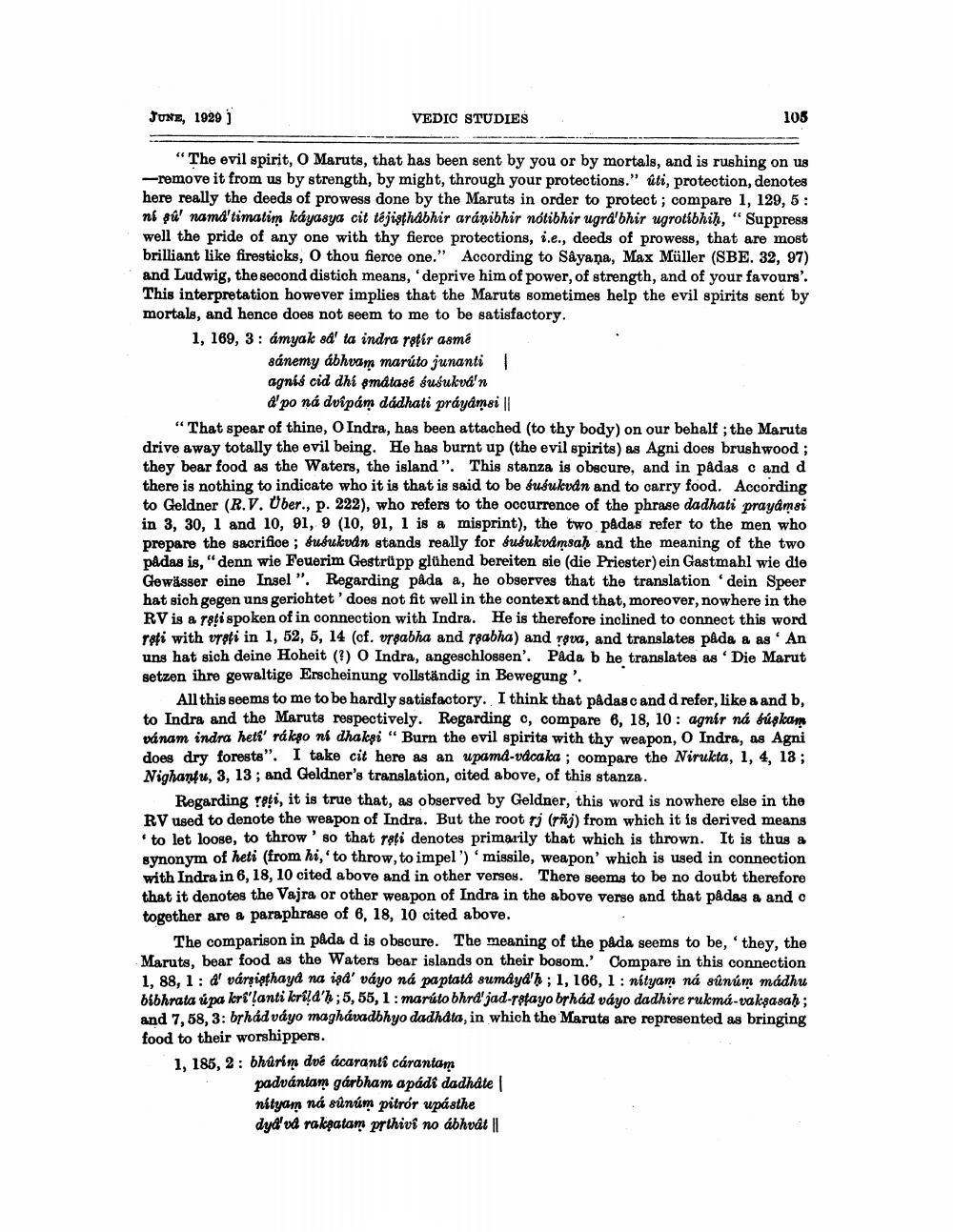________________
JUNE, 1929
VEDIC STUDIES
105
“The evil spirit, O Maruts, that has been sent by you or by mortals, and is rushing on us -remove it from us by strength, by might, through your protections." úti, protection, denotes here really the deeds of prowess done by the Maruts in order to protect; compare 1, 129, 5: né sú' namd' timatim káyasya cit téjisthabhir aránibhir notibhir ugrá'bhir ugrotibhih, “Suppress well the pride of any one with thy fierce protections, i.e., deeds of prowess, that are most brilliant like firesticks, O thou fierce one." According to Sayaņa, Max Müller (SBE. 32, 97) and Ludwig, the second distich means, 'deprive him of power, of strength, and of your favours'. This interpretation however implies that the Maruts sometimes help the evil spirits sent by mortals, and hence does not seem to me to be satisfactory. 1, 169, 3: ámyak sd' ta indra refir asme
sánemy ábhuam marúto junanti ! agnis cid dhi smatasé sušukvá'n
d'po ná dvípám dádhati práyamsi || “That spear of thine, O Indra, has been attached (to thy body) on our behalf ; the Maruts drive away totally the evil being. He has burnt up (the evil spirits) as Agni does brushwood; they bear food as the Waters, the island". This stanza is obscure, and in padas c and d there is nothing to indicate who it is that is said to be dusukvdn and to carry food. According to Geldner (R.V. Uber., p. 222), who refers to the occurrence of the phrase dadhati prayamsi in 3, 30, 1 and 10, 91, 9 (10, 91, 1 is a misprint), the two padas refer to the men who prepare the sacrifice; susukvan stands really for subukvamsah and the meaning of the two padas is, "denn wie Feuerim Gestrüpp glühend bereiten sie (die Priester) ein Gastmahl wie die Gewässer eine Insel ". Regarding pada a, he observes that the translation 'dein Speer hat sich gegen uns gerichtet' does not fit well in the context and that, moreover, nowhere in the RV is a reti spoken of in connection with Indra. He is therefore inclined to connect this word reti with vrati in 1, 52, 5, 14 (cf. vrgabha and reabha) and rova, and translates pada a as An uns hat sich deine Hoheit (?) O Indra, angeschlossen'. Pada b he translates as Die Marut setzen ihre gewaltige Erscheinung vollständig in Bewegung'.
All this seems to me to be hardly satisfactory. I think that padas c and d refer, like & and b, to Indra and the Maruts respectively. Regarding c, compare 6, 18, 10: agnir ná súskam vánam indra heti' rákpo ni dhaksi " Burn the evil spirits with thy weapon, O Indra, as Agni does dry forests". I take cit here as an upamd-vácaka; compare the Nirukta, 1, 4, 13; Nighantu, 3, 13; and Geldner's translation, cited above, of this stanza.
Regarding rati, it is true that, as observed by Geldner, this word is nowhere else in the RV used to denote the weapon of Indra. But the root rj (rñj) from which it is derived means * to let loose, to throw so that reți denotes primarily that which is thrown. It is thus & synonym of heti (from hi, to throw, to impel) ' missile, weapon which is used in connection with Indra in 6, 18, 10 cited above and in other verses. There seems to be no doubt therefore that it denotes the Vajra or other weapon of Indra in the above verse and that padas a ando together are a paraphrase of 6, 18, 10 cited above.
The comparison in påda d is obscure. The meaning of the pada seems to be, they, the Maruts, bear food as the Waters bear islands on their bosom. Compare in this connection 1, 88, 1: a várşisthayd na igd' váyo na paptata sumaya'h ; 1, 166, 1: nityam ná súnúm madhu bibhrata úpa kré'lanti koriļa'h ;5, 55, 1: marúto bhrd' jad-Tatayo byhád váyo dadhire rukmá-vaksasah; and 7,58, 3: byhád váyo maghávadbhyo dadhdta, in which the Maruts are represented as bringing food to their worshippers. 1, 185, 2: bhûrim dve ácaranti carantam
padvántam gárbham apádi dadhate nityam ná súnúm pitrór upásthe dyd' od rakgatam prthivi no ábhrát ||




